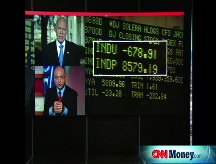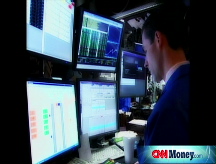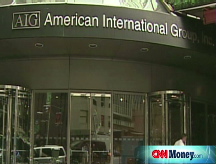Dow tumbles 7%
Dow falls below 8,600 for first time since 2003 - on the 1-year anniversary of its all-time high.

NEW YORK� (CNNMoney.com) -- Markets tanked Thursday - with the Dow falling nearly 700 points during the session - as panicked investors dumped stocks across the board.
Bank lending remained tight as nervous institutions continued to hoard cash. Treasury prices fell, raising their corresponding yields. The dollar gained versus the euro and the yen. Oil, gas and gold prices fell.
The Dow Jones industrial average (INDU) lost 679 points, or 7.3%, closing at its lowest point since May 21, 2003. It was the Dow's third biggest one-day point-loss ever.
The Standard & Poor's 500 (SPX) index lost 7.6% and closed at its lowest point since April 28, 2003. The Nasdaq composite (COMP) lost 5.5% and closed at its lowest point since June 30, 2003.
A key measure of investor fear hit an all-time high: The CBOE Volatility (VIX) index, or the VIX, hit nearly 64.
Over the last seven sessions, the Dow has lost 2,271 points, or 20.1%. Since hitting an all-time high of 14,164.53 one year ago today, the Dow has lost 39.4%.
"We are in a free fall right now and fundamentals have been thrown out the window," said Phil Orlando, chief equity market strategist at Federated Investors.
Stocks have tumbled despite a series of efforts on the part of the government to unfreeze the credit markets and get money flowing through the system again.
On Thursday, the Treasury said it was looking to buy stakes in some banks as part of the $700 billion bank bailout law enacted last week. The main focus of the bailout remains buying bad assets from banks.
The Fed and Treasury have done many things right, but the markets realize that these programs won't have an impact on the market until six to nine months out, Orlando said.
"[Third quarter] earnings will still be poor, [third-quarter] GDP will be a disaster," he said. "Investors are trying to price in the depth of the recession now."
One year ago today, the S&P 500 hit an all-time high of 1565.15. As of Thursday's close, it was down 41.9%.
The Nasdaq has never come close to its record of 5,048.62 hit on March 10, 2000, at the end of the tech bubble. But after hitting a six-year high of 2,859.12 last Halloween, the Nasdaq had slipped 42.5%, as of Thursday's close.
Stocks had slumped throughout the year, but the selling accelerated in September following a series of bank failures and mergers.
"The Lehman bankruptcy was really the failure that triggered this waterfall event we've been going through," said John Merrill, chief investment officer at Tanglewood Wealth Management.
"Suddenly people who thought they had access to money didn't have money and they had to sell something," he said. "So it started with forced selling and it's turned into a panic."
After the close of trade Thursday, Citigroup said it failed to reach a deal with Wachovia. Citi said that although it will seek damages, it won't block a Wachovia (WB, Fortune 500)-Wells Fargo (WFC, Fortune 500) merger.
GE is due to report earnings Friday. In addition, President Bush is expected to make a statement in the morning, telling investors that economic officials are doing everything they can to stabilize our financial system.
Movers: General Motors (GM, Fortune 500) lost 31% Thursday and Ford Motor (F, Fortune 500) fell 21% on reports that auto sales will hit recession levels this year and get worse in '09. In response, S&P put GM and Ford's debt ratings on CreditWatch with a negative outlook. (Full story)
IBM (IBM, Fortune 500)'s better-than-expected earnings had lifted tech stocks in the morning, but even Big Blue got dragged down in the afternoon slump.
Oil services stocks slumped in tune with a slide in oil prices. Chevron (CVX, Fortune 500) lost over 12% and Exxon Mobil (XOM, Fortune 500) lost nearly 12%.
GM, IBM, Chevron and Exxon are all Dow components. All 30 Dow stocks fell. Other big Dow losers included financial components Bank of America (BAC, Fortune 500), Citigroup (C, Fortune 500) and JP Morgan Chase (JPM, Fortune 500).
Former Dow component AIG (AIG, Fortune 500) plunged 25% on late Wednesday reports it is taking a Fed loan of up to $37.8 billion. The insurance giant already received an $85 billion Fed loan last month that helped it skirt bankruptcy.
Other financial stocks slumped as well, with Morgan Stanley (MS, Fortune 500) and Merrill Lynch (MER, Fortune 500) both losing 26% after the three-week old short-selling ban was lifted late Wednesday.
In short-selling, traders place bets that a stock will fall. The SEC banned the shorting of nearly 800 financial stocks after critics said it added to the accelerated bloodletting in financial stocks in the summer and early fall.
Credit markets frozen: Amid the ongoing crisis, lending has dried up, making it difficult for businesses to function on a daily basis and for consumers to get loans.
In an effort to get money moving again, the government has taken a number of dramatic steps, including announcing an emergency interest-rate cut Wednesday, coordinated with banks around the world.
Earlier in the week, the Fed said it will buy short-term debt needed to finance daily operations directly from businesses. It also said it will make $300 billion available to banks in return for damaged assets, on top of $300 billion already available. And Congress approved the $700 billion bank bailout plan last Friday.
But despite all these developments, credit markets have barely budged.
"What the Fed has done is eventually going to help turn things around, but people don't believe it yet," said Gary Webb, CEO at Webb Financial Group.. "They're acting on fear."
A Federal Reserve report Thursday showed that the market for commercial paper continued to shrink in the last week. (Full story)
Libor, the overnight bank lending rate, eased to 5.09% Thursday from 5.38% Wednesday, according to Bloomberg.com. However, the levels were still high considering that Libor was at 2.15% a month ago.
Three-month Libor, or what banks charge each other to borrow for three months, rose to 4.75% Thursday from 4.52% Wednesday.
The TED spread, the difference between what banks pay to borrow from each other for three months and what the Treasury pays, spiked to an all-time high of 4.23% Thursday.
The wider the spread, the more reluctant banks are to lend to each other, rather than from the federal government. When markets are fairly calm, banks charge each other premiums that are not much higher than the U.S. government.
The yield on the 3-month Treasury bill, seen by many as the safest place to put money in the short term, fell to 0.5% Thursday from 0.64% late Wednesday. Last month, the yield on the 3-month bill skidded to a 68-year low around 0% as panicked investors fled equities, accepting virtually no return on their money rather than risk losing it in the stock market.
Treasury prices slipped, raising the yields. The benchmark 10-year note fell 1-1/32, raising the corresponding yield to 3.76% Thursday from 3.63% late Wednesday. Treasury prices and yields move in opposite directions.
On the economic front, weekly jobless claims edged off a seven-year high, but they still outpaced forecasts. (Full story)
Other markets: U.S. light crude oil for November delivery fell $2.36 to settle at $86.59 a barrel on the New York Mercantile Exchange. Prices slipped on continued bets that the slowing global economy will hurt demand. (Full story)
Oil prices have tumbled on bets of slowing demand since the price of crude hit an all-time high of $147.27 a barrel on July 11.
The price of gas decreased for the 22nd consecutive day, according to a survey of credit card activity by motorist group AAA. (Full story)
COMEX gold for December delivery fell $20 to settle at $886.50 an ounce.
In currency trading, the dollar gained against the euro and the yen.
Worried about your retirement? Tell us your story ![]()




